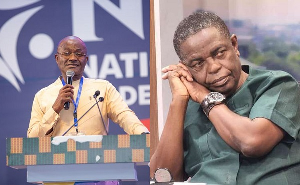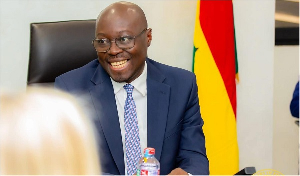It is undeniably true that since the recent advent of democracy in Ghana, there have been real beneficial changes in the country. We are now freer than ever to do, go and say virtually what we want albeit within the confines of the law. It is also true that not every aspect of our lives have been altered for the better. While there is real freedom cronyism, corruption, unemployment, poverty, poor health provision, power outages, mismanagement, and a host of other evils continue to blight our lives. However, even the most ardent critic of our current democracy will admit that we are now better placed to achieve real economic development. This is a credit to both the immediate past and present democratic governments; respecting the decisions made by the electorate at the ballot box.
We are still at the bottom left hand corner of a steep learning curve in democratic governance (having failed abysmally in the past) and we all need to be patient and alert in order to help create a really successful nation. For this to happen we need to be better informed. There is therefore an urgent need for better communication between our governments and the electorate in order to create the sort of transparency which is so vital for the sustenance of democracy.
Naturally, while government failures are glaringly obvious the successes are not readily recounted in many circles. This is bad for the country as a whole and calls for improved strategic communications to project some of the vital achievements that have, and continue to take place. We need to highlight government achievements through proactive communication initiatives. Both NDC and NPP have failed abysmally in communicating with the electorate. This could be a factor in the persistence of corrupt practices despite the so called ?zero tolerance? on the part of this government in an attempt to minimise the spread of the ?disease.?
In Britain, for example, there is the Central Office of Information (COI). It is the Government's centre of excellence for marketing and communications. The COI works with departments and public bodies to produce information campaigns on issues that affect the lives of every citizen - from health and education to benefits, rights and welfare. It directly connects the people to the government in a variety of ways including the provision of a web directory for matters as diverse as; crime, justice, legal rights, social welfare and government spending, ect.
We might not have the need or the resources to follow suit, but we would benefit a great deal in promoting better government communication.
Communication
There are several definitions for communication.The Oxford English Dictionary defines communication as "the imparting, conveying, or exchange of ideas, knowledge, information, etc."
Another definition describes it as ?the exchange of thoughts, messages, or information, as by speech, signals, writing, or behaviour.
The art and act of communication spawn several professional activities. It is therefore a large and amorphous area. It comprises various disciplines, many of which overlap, have different names and refer to different activities depending on the practitioner?s perspective and underlying objective.
Some of the main communication disciplines are; journalism, public relations, internal communications, corporate communications, marketing, advertising, branding, public affairs, investor relations. There are many more. All are aimed at different audiences and use different tools, activities and channels to convey a message.
Government communications falls into the area of public affairs and therefore public communication. Public communication systems, including; newspapers, advertisements, radio, television programmes, feature films, posters, and now the internet, play a pertinent role in organising the images and discourses through which we make sense of the world around us. Events and activities, including government achievements and failures only reach us via such channels. It is therefore important for future governments (the present one has ran out of time, possibly) to create a proactive department whose sole responsibility is to positively take the lead to educate and inform.
Presently, most of our fellow countrymen live in an information starved society. Apart from the scraps and half baked truths that we are fed on daily, it is virtually impossible for a man from say Fanchiniko in the Santrofie Region to walk into a government resource centre in his district and ask for information on how to contact, say the Insurance Ombudsman, or how much money the government has spent on improving schools in his area since it came to power.
This means that most people don't even know how much they should but don't know. Ultimately, such information should be available on the website of the relevant government department. But we do not live in an ideal world and we have not reached that level yet. Still, such information should be freely and readily available in the relevant ministry and its regional and district annexes. It is called ?freedom of information?.
If we are to rid ourselves of the rumours that have characterised and shaped our warped and often distorted views of previous governments (and which have led to government overthrows and arrested developments in our nation), then it is pivotal for the nation to establish a proactive Government Communications Agency. Such an agency should be apolitical and seek to serve all governments irrespective of political leanings. It should therefore be devoid of political influence and cannot be dragged into the murky waters of political bias and propaganda.
The purpose of such an agency would be to generate ?value added? governance and extol the virtues of democratic principles in the country. It is not about bashing the opposition or about castigating previous governments. It is simply about furnishing the populace with information and helping to educate on what has been achieved through democracy and how more could be achieved given the right leadership. It is about creating an informed electorate and strengthening our ability to choose the right party and candidates to rule our country; it?s about sharpening our senses of polititical scrutiny by opening up issues and empowering us to be critical and preventing cover ups.
There is clearly a large role for government communications of the purely informative and educative variety. As governments make new policies and transformation takes hold, the task is to effectively create and disseminate basic information on a wide range of issues which are new to most people, or is already in the public domain but inaccessible for a host of reasons. The restructuring of such a central communications service needs to start with a communications strategy.
Drawing up a communication strategy is an art, and there are lots of different ways of approaching the task. The guide below does not therefore contain hard and fast rules. Communication strategy can apply to an individual project to achieve a short term objective, or it can refer to the communication strategy which sits at the heart of government plans to inform the public and eliminate rumours in order to achieve the overarching governmental goal of cultural and social change.
To understand communications, we need to know a little about the theory behind it. According to Wilfred Schramm, Communication is when a sender sends a message to a receiver and the message is received and interpreted exactly as intended by the sender. For this to happen, the message and the channel chosen to convey it should be appropriate and devoid of noise; the receiver must also be the right target. The sender must further know the impact of the message through a feedback mechanism. It is the achievement of this feat, which has not always been easy, that demands the need for a strategic approach.
Whether the communication strategy is designed for a specific project or for a long term change in the mindset of the populace, it should establish the following:
Objectives ? what it aims to achieve.
Audiences ? the target audience.
Messages ? the underlying message to be conveyed.
Tools and activities ? how the strategy would be carried out.
Resources ? the resources to be employed and through what channels.
Timescales ? the timeframe needed to reach identified milestones.
Evaluation ? how to look back in order to move forward.
Objectives
Objectives are the key to the success of a communications strategy. They should ensure that the communications strategy is centrally (in this case, governmentally) driven rather than communications driven. This means that the government, in consultation with the districts and the civil servants, should set the agenda, and for the communicators to work within the provisions of the agenda. The communications activities are not an end in themselves but should serve and hence be aligned with the overall governmental objectives. The professionals involved should be asking themselves what they can do within communications to help the government to achieve its core objectives.Aligning the communications and governmental objectives will also help to reinforce the importance and relevance of the message (communications) and thereby make a convincing case for the proper resourcing of communications activities within the government.
Audiences
The government should identify those of its citizens with whom there is a particular need to communicate in order to achieve certain governmental objectives. The best audiences to target in order to achieve an objective may not always be the most obvious ones, and targeting audiences such as the media may not always help to achieve the main objectives.Everyone would like a higher media and political profile, yet activities aiming towards this may ultimately be self-serving and only communications driven, with no wider impact. They can even have a negative effect if you dedicate resources towards what could otherwise be put towards communicating with key stakeholders.
While the entire population form the audience, particular sections might benefit from certain information more. Take the case of land disputes and the environmental impact for Ghana. Land owners who sell a plot of land to several people and property developers should be targeted in any campaign to eliminate the problem, alongside the institution of better land administration system and a robust legal framework to deal with any breaches and disputes. While the whole nation must be made aware, the primary target should form the focus from which to spring a communication offensive aimed at effecting a change in the mindset of section of the population that have special interests in land sale and acquisition.
Messages
Strategic targeting and consistency should be the key to the governments? messages. There should be a comprehensive case covering all the key messages, and an emphasis on the different elements of the case for different audiences.To maximise impact there should be a summary of the case in basic key points which can be constantly repeated. Remember that communications is all about storytelling: therefore, the basic key points could be generated using interesting narrative, human interest stories and arresting imagery.
Tools and activities
The most significant aspect here is to identify the tools and activities that are most appropriate to communicating the key messages to the audiences. These will be suggested by audiences, messages, or a combination of the two. For example, an annual report is a useful tool in corporate communications whereas an in-house magazine lends itself well to internal communications. The government should ensure that it tailors the tools and activities to the level of time and human and financial resources available. It must also use a combination of channels to avoid noise and interference so as to deliver a discernible message. The communication professionals to be engaged should remember the simple steps towards furnishing our fellow citizens with the truth; that is communication should be:
timely ? otherwise it becomes irrelevant; realistic ? because we want to paint a true picture; unambiguous - in order to eliminate confusion; tight ? because loose communication detracts from the core message; and honest - so as to restore faith in the establishment.
Resources and timescales
The key rules to observe are always to deliver what you promise and never over promise. Just because it wants to retain power, there should not be an attempt to exaggerate the level of commitment. There should therefore be an attempt to use resources and timescales to set legitimate levels of expectations. If at any point, more resources or an extended time to deliver is required, a proper outline of the case for more dedicated resources or time should be drawn up and be ready for scrutiny.Evaluation and amendment
The evaluation of a programme/project could include a communications audit to assess the effectiveness of the strategy with both internal and external audiences. This should include the use of open questions with appropriate prompts and benchmarks and if possible, enlist the services of independent consultants to work alongside the normal staff in order to get a comprehensive picture. Those at the helm could then consider and discuss the results carefully and use them to amend the original strategy, if need be.Example of audiences to consider will be the staff, the electorate, key political targets and the media. Questions to consider asking are:
What do you read/see/hear?
What works/doesn't work?
What do you want to see more of?
What information do you need that you are not currently supplied with?
How often do you want us to communicate with you?
The periodic provision of a detailed communications plan from the strategy and monitoring and reporting the activities against the original objectives contained within the strategy ensures that the focus is not lost.
Drawing up a strategy should involve a team of professionals, and on a larger scale, the entire nation. The government should also seek approval from both parliament and the civil servants likely to be involved the communications strategy. The whole idea behind this whole communication initiative and the need to set up an independent communication agency should be fed into the existing political channels to ensure maximum support, alignment and efficiency.
For current and successive governments, more effort should be made to ensure that government successes are well highlighted to equip the electorate with better understanding so that they can make informed choices at the ballot box. A good government will acknowledge its failings while pointing out where things have fared rather better and also project the way ahead. The way ahead should also include how lessons from past mistakes would contribute to better governance. This sort of honest self appraisal cannot be ignored because you cannot pull the wool over the eyes of an astute and well informed electorate. It could spell the end of cheque-book democracy.
A government communications agency which is able to perform and deliver such perspectives for citizens to digest and rationalise will definitely go a long way towards creating a politically astute nation. Rumours and their impact would be limited and coups will be consigned to the annals of history.
Every government has a responsibility to communicate as effectively and efficiently as it can with the people who elected it. In fact the media in Ghana is currently not as powerful as it could be. It is therefore more important to have a strong, effective and credible government communications agency. The better government communications are the less likely we are to have diametrically opposite divisions in our society.















